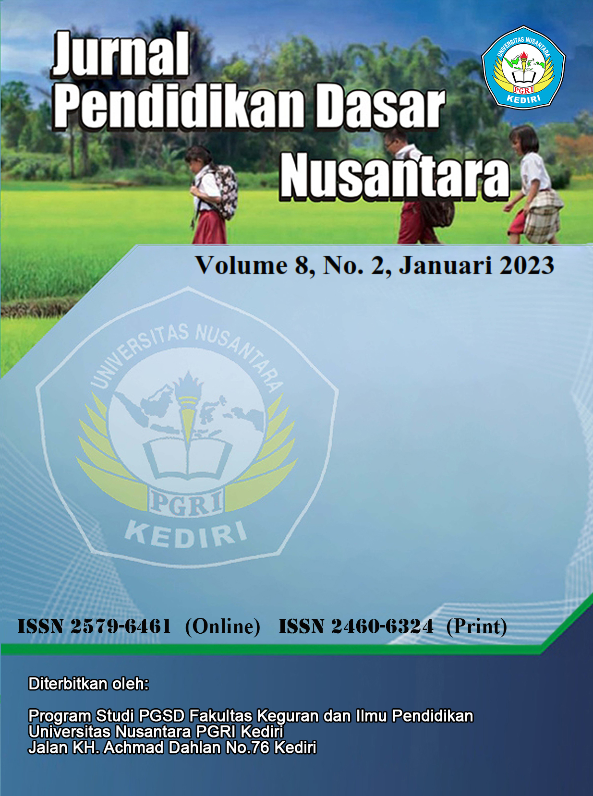Implementation analysis and problems of implementing of literacy movement in primary schools
DOI:
https://doi.org/10.29407/jpdn.v8i2.18920Keywords:
Analysis, Application, GLS ProbelmaticsAbstract
The purpose of this study is to analyze the application and problems of implementing literacy movement in primary schools. This type of research is descriptive qualitative. The data sources in this study were all school residents at SDN Tlogomas 2 Malang City. The research data was conducted using interview techniques and documentation using interview instruments and guidelines. The implementation of literacy movement at SDN Tlogomas 2 Malang City is divided into three stages: habituation, development, and learning. The literacy movement also had some problems that trying to overcome together at SDN Tlogomas 2.
Downloads
References
Agustin, S., & Cahyono, B. E. H. (2017). Gerakan Literasi Sekolah untuk Meningkatkan Budaya Baca di SMA Negeri 1 Geger. Linguista: Jurnal Ilmiah Bahasa, Sastra, Dan Pembelajarannya, 1(2), 55. https://doi.org/10.25273/linguista.v1i2.1973.
Ahmadi, Farid., Hamidulloh Ibda.2018. Media Literasi Sekolah (Teori dan Praktik). Semarang : CV Pilar Nusantara.
Akbar. (2017). Gerakan Literasi Sekolah Sebagai Upaya Penumbuhan Karakter Siswa Sekolah Dasar. Malang: Universitas Negeri Malang.
Antasari, I. W. (2017). Support Parents On Building Children’s Literacy. Edulib, 6(2). Costello, D. A. R. (2012). The impact of a school’s literacy program on a primary classroom. Canadian Journal of Education, 35(1), 69–81.
Faradina, N. 2017. Pengaruh Program Gerakan Literasi Sekolah terhadap Minat Baca Siswa di SD Islam Terpadu Muhammadiyah An-Najah Jatinom Klaten. Jurnal Hanata Widya, 6 (8): 60– 69.
Hidayat, M. ., Basuki, I. ., & Akbar, S. (2018). Gerakan literasi di Sekolah Dasar. Jurnal Pendidikan: Teori, Penelitian, Dan Pengembangan, 3(6), 810–817. Retrieved from http://journal.um.ac.id/index.php/jptpp/article/view/1121
Huda, F. (2017). Peran Kegiatan Literasi Dalam Meningkatkan Minat Baca dan Menulis Siswa Sekolah Dasar. Jurnal JPSD STKIP Sebelas April Sumedang, 3(1), 42–52.
Indi, Samsul, Dewi, M.Thamrin. 2020. Gerakan Literasi Sekolah Pelaksanaan, Hambatan, dan Solusi (Studi Kasus Di SD Ghufron Faqih Surabaya). 93-105. https://ejournal.stkipbbm.ac.id/index.php/gm/article/view/454
Kasiun, S. (2015). Upaya Meningkatkan Minat Baca sebagai Sarana untuk Mencerdaskan Kehidupan Bangsa. Jurnal Pena Indonesia (JPI), 1(1), 79–95.
Kumullah, R., Yulianto, A., & Ida, I. (2019). Peningkatan Membaca Permulaan Melalui Media Flash Card pada Siswa Kelas Rendah Sekolah Dasar. Jurnal Pendidikan, 7(2), 36-42.
Moleong, L. J. 2010. Metodologi Penelitian Kualitatif. Bandung: PT Remaja Rosdakarya
Mullis, I. V., & Martin, M. O. (2013). TIMSS 2015 Assessment Framework. Chestnutt Hill: TIMSS & PIRLS International Study Center.
Nurjaya. (2017). Implementasi Program Gerakan Literasi Sekolah (Gls) Di SMA Negeri 1 Singaraja. Singaraja: Volume. 7 No. 2.
Pradana, B. H., Fatimah, N., & Rochana, T. (2017). Pelaksanaan Gerakan Literasi Sekolah Sebagai Upaya Membentuk Habitu Literasi Siswa di SMA Negeri 4
Magelang. Journal of Education, Society, and Culture, 6(2), 167–179. Retrieved from http://journal.unnes.ac.id/sju/index.php/solidarity.
Ramdhani, M. A. (2014). Lingkungan Pendidikan Dalam Implementasi Pendidikan Karakter. Jurnal Pendidikan Universitas Garut, 8(1), 28–37.
Rohman, S. (2017). Membangun Budaya Membaca pada Anak Melalui Program Gerakan Literasi Sekolah. TERAMPIL (Jurnal Pendidikan Dan Pembelajaran Dasar), 4, 151–174.
Silvia, O. W., & Djuanda, D. (2017). Model Literature Based dalam Program Gerakan Literasi Sekolah. Mimbar Sekolah Dasar, 4(2), 160–171. https://doi.org/10.23819/mimbar-sd.v4i2.7799
Wandasari, Y. 2017. Implementasi Gerakan Literasi Sekolah (GLS) Sebagai Pembentuk Pendidikan Berkarakter. JMKSP (Jurnal Manajemen, Kepemimpinan, Dan Supervisi Pendidikan), 2 (2): 12–22.
Wiedarti, dkk. (2016). Desain Induk Gerakan Literasi Sekolah. Jakarta: Direktorat Jenderal Pendidikan Dasar dan Menengah Kementerian Pendidikan dan Kebudayaan
Downloads
Published
Issue
Section
License
Authors who publish with this journal agree to the following terms:
- Copyright on any article is retained by the author(s).
- The author grants the journal, the right of first publication with the work simultaneously licensed under a Creative Commons Attribution License that allows others to share the work with an acknowledgment of the work’s authorship and initial publication in this journal.
- Authors are able to enter into separate, additional contractual arrangements for the non-exclusive distribution of the journal’s published version of the work (e.g., post it to an institutional repository or publish it in a book), with an acknowledgment of its initial publication in this journal.
- Authors are permitted and encouraged to post their work online (e.g., in institutional repositories or on their website) prior to and during the submission process, as it can lead to productive exchanges, as well as earlier and greater citation of published work.
- The article and any associated published material is distributed under the Creative Commons Attribution-ShareAlike 4.0 International License

































